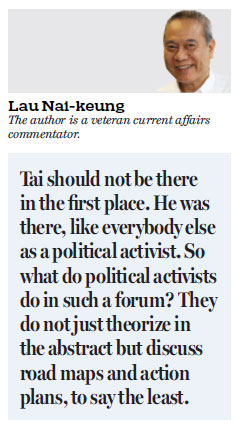Benny Tai, Die Hard, still remains at large
Updated: 2018-04-10 06:37
(HK Edition)
|
|||||||
Benny Tai Yiu-ting should have been in jail long ago because of planning and inciting "Occupy Central" in 2014 but he wasn't. He should again be locked up for rigging the 2016 Legislative Council election through the "ThunderGo Project" but he was still at large.
Recently Tai went to a meeting of Chinese separatists in Taipei and advocated "nation building" for Hong Kong. He has again crossed the line. Many people want him kicked out of the University of Hong Kong where he is tenured associate professor of law. Some want him to be prosecuted for advocating "Hong Kong independence". Some even demand him to hand over his People's Republic of China (Hong Kong Special Administrative Region) passport because he is not qualified to be a Chinese citizen.

For his seditious actions, Tai has been roundly condemned by the Hong Kong and Macao Affairs Office of the State Council, the Liaison Office of the Central People's Government in the HKSAR and the chief executive of the HKSAR. Even the People's Daily has an editorial blasting him. Yet Tai is still teaching in the University of Hong Kong, still holds his PRC (HKSAR) passport and still walks freely, talks freely all over town.
This is Benny Tai, Die Hard, and he is now elevated to be a hero of Hong Kong's separatist movement.
Some pundits noted that Hong Kong is a free society and the freedom of speech is very much championed. To them, Tai was just exercising his freedom of speech in Taipei, analyzing a scenario of Hong Kong's future. Judging from its context, this was clearly not the case.
It was above all a Chinese separatists' forum and Tai was presenting his forecast about what would happen in China and a proposal of "Hong Kong independence". Tai is a law professor, not a political scientist. So he was not participating in this seditious forum in a professional capacity.
This is clearly out of bounds, as Tai should not be there in the first place. He was there, like everybody else as a political activist. So what do political activists do in such a forum? They do not just theorize in the abstract but discuss road maps and action plans, to say the least.
With other Chinese separatists present, these people are not discussing only "Hong Kong independence", but coordinating separatist movements of the entire country. With a little stretch of imagination, this could amount to a conspiracy to carve up the country. That is why the central government is so uptight about it.
This separatist forum took place in Taiwan, and the central government cannot do anything about it for the mean time. But the Hong Kong participant, Tai, should at least be questioned about it. In other countries, the police or some secret service agents will come knocking at Tai's door.
We know Tai was not the only Hong Kong participant in the forum but so far no one has been touched. Because there was no accusation about what they said in the forum, it does not mean that their participation is legal. Like Tai, they should not be there either. Sedition of any form should be strictly forbidden. In case of doubt, look at the fate of Carles Puigdemont, leader of the Catalonia independence movement in Spain.
Hong Kong is part of China and is governed by its Constitution and the Hong Kong Basic Law. Tai has clearly violated the spirit and letter of both but it seems that there is nothing we can do about it. The university says they cannot fire him. No authority wants to snatch his passport, nor arrest him. All the strong condemnations from central government and the SAR officials seem just empty words. Some may wonder, who is in charge here?
Some people start to raise the question of national security legislation under Article 23 of the Basic Law. Two decades after Hong Kong's return to China, the SAR government still does not have a timetable for it. Looking back, the original thinking of this legislation is clearly outdated and cannot cope with current developments in the SAR and the modern and more encompassing concept of national security, which in Chinese mainland legislation covers 11 categories.
The urgency of national security legislation is now heightened especially after this Tai saga. For without it, legally there is not much we can do about it.
(HK Edition 04/10/2018 page8)